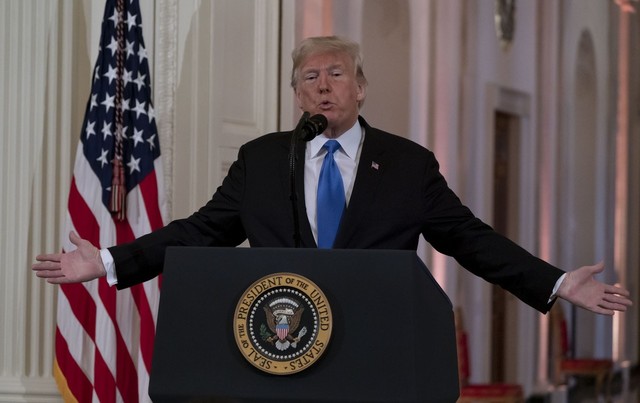 |
|
US President Donald Trump makes a speech at the White House after the US midterm elections on Nov. 7. (UPI)
|
Republican majority in Senate limits Democrats’ influence on foreign policy
Now that the US midterm elections have concluded with the Republicans holding the Senate and the Democrats taking the House of Representatives, what effect will this have on US President Donald Trump’s policy toward the Korean Peninsula? The view of the majority of experts is that the outcome of this election will not have a big effect on the Trump administration’s Korean Peninsula policy. First of all, American foreign policy is set by the president and the executive branch, with the Senate Committee on Foreign Relations and the Senate Committee on Armed Services also playing an important role. Since the Senate remains in the hands of the Republican Party, the Democratic House’s impact on foreign policy will be limited. The fact that Trump is likely to concentrate his efforts on his reelection campaign after the “predestined defeat” in the midterm elections is itself a “green light” for negotiations on North Korea’s nuclear weapons. In the presidential election, unlike the midterms, the assessment of foreign policy plays an important role. Since Trump pulled out of the Iranian nuclear deal, which was the signature diplomatic achievement of his predecessor, Barack Obama, and fully reimposed economic and financial sanctions on Iran, he needs to compensate by making some diplomatic achievement of his own, and his most likely option is North Korea. “American experts and the mainstream press have attacked Trump for withdrawing from the nuclear deal even though Iran never broke it and continue to make comparisons to Trump’s negotiations on the North Korean nuclear issue. This gives Trump an even greater need to get some diplomatic results in the North Korean negotiations to make up for the Iranian nuclear deal,” said Lee Hye-jeong, a professor at Chung-Ang University and an expert on American politics. The Trump administration is likely to reschedule the postponed high-level talks with North Korea to continue the momentum for dialogue and to push for progress in the nuclear talks during the second summit with the North early next year. Trump could then cite this as a major accomplishment when he runs for reelection two years hence. Democrats may try to slow down N. Korea negotiations without overtly blocking them The Democratic Party, which has regained a majority in the House of Representatives after eight years, has been critical of Trump’s approach to negotiations on the North Korean nuclear issue. But the Democrats are unlikely to either completely sabotage the negotiations or to switch to active support. The party has only raised doubts about Trump’s negotiating methods and North Korean leader Kim Jong-un’s commitment to denuclearization without offering a clear alternative in regard to denuclearization. The most likely scenario is one in which the Democrats slow down the negotiations by requesting related documents and holding frequent hearings in the House to have government officials testify about the negotiations. But they’re likely to try to maintain balance by avoiding the appearance of outright blocking the Trump administration’s diplomatic attempts to achieve denuclearization. In an interview with Reuters on Nov. 7, Rep. Eliot Engel, the New York Democrat who is slated to lead the House Committee on Foreign Affairs, said he didn’t oppose negotiations with North Korea per se: “I think it’s good to have some kind of a dialogue with them. But we shouldn’t be deluded in thinking that they’re going to have any major changes. How midterm elections have changed US Korean Peninsula policy in the past There are two well-known examples in American political history of US Korean Peninsula policy changing sharply after a midterm election. In 1994, the Democratic administration under President Bill Clinton reached an agreement with North Korea in Geneva that defused the first North Korean nuclear crisis, but that agreement ran into trouble when the Republicans took control of both houses of Congress in the midterm elections that year. Later, Republican President George W. Bush denounced North Korea as part of the “axis of evil,” but when his party was defeated in the midterm elections in 2006, he took a softer line on North Korea and even discussed formally ending the Korean War and signing a peace treaty with the North. Will history repeat itself once again this time? “Even after the loss in the midterm elections, the Clinton administration moved forward with the Perry Process, which was based on engagement toward North Korea, and the Bush administration’s change in policy toward the North was affected not only by the defeat in the midterms but also by public frustration with the worsening military conditions in Iraq. Especially considering that the Trump administration represents a very special case to which the normal rules of American politics don’t apply, it wouldn’t be right to infer from these examples that the US’ Korean Peninsula policy will change,” Lee Hye-jeong said. By Park Min-hee, staff reporter Please direct comments or questions to [english@hani.co.kr]






